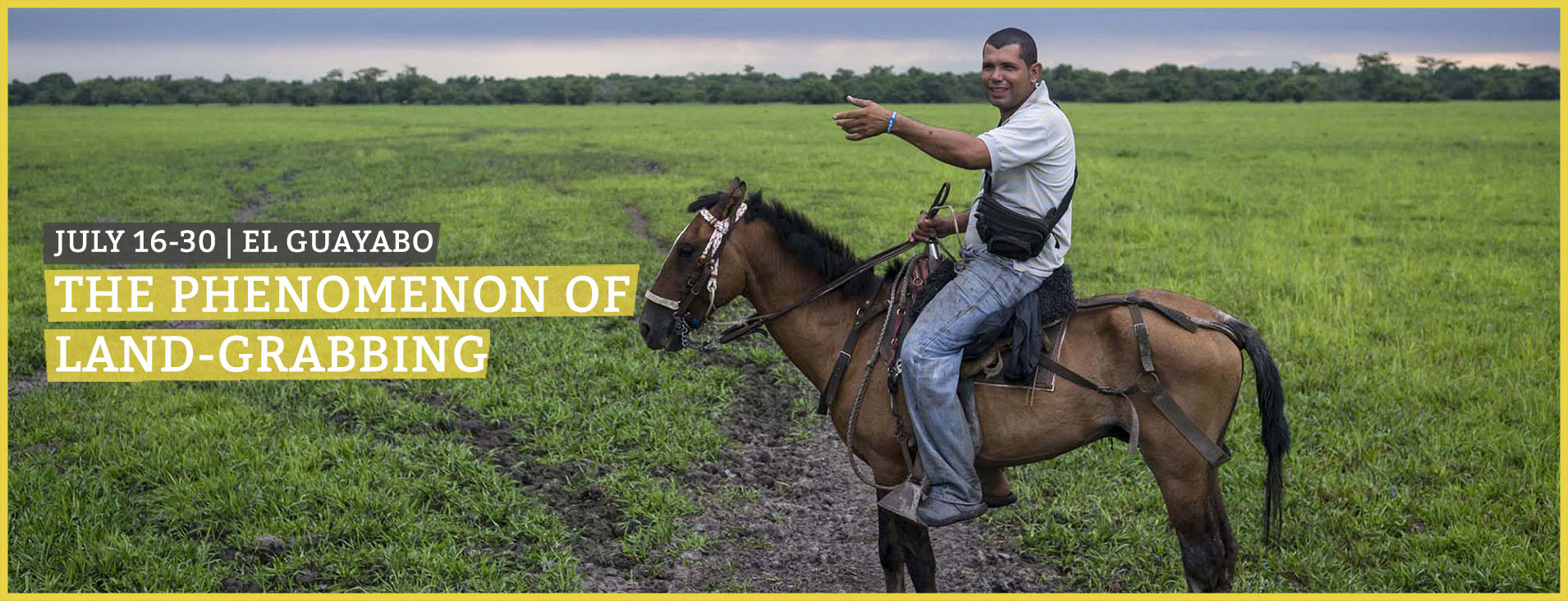CPTnet
6 February 2017
COLOMBIA: Justice Denied
by
Kody Hersh
Mid-January,
2017. I am about two weeks into a month-long stint as a reservist with the CPT
Colombia team. I’ve visited the rural community of Guayabo, where campesino
farmers and their families and communities have been embroiled in an extensive
land claim struggle with the son of a former landowner. Though the actions of
the people of Guayabo in defense of their land have been legal and nonviolent,
local officials, who have sided with the claimant, Rodrigo Lopez Henao,
throughout the process, issued arrest warrants several months ago for four
community leaders. One, Álvaro García, was arrested at home at the crack of
dawn. After going into hiding for six months, seeking legal help, and building
a defense, the remaining three community leaders turned themselves in to the
authorities. Most accusations against them were immediately dropped for lack of
evidence, and they were allowed to return home until the case is resolved– but
Álvaro has been held for eight months now, awaiting charges and a hearing at
which his lawyers can petition for his release.
The
CPT team has been visiting Álvaro regularly in jail in Barrancabermeja, which
is several hours by boat from his family and community, and attending hearings
in his case. I join my CPT teammate at a hearing in which Álvaro’s lawyers hope
to conclude opening arguments and move closer to the point at which they can
request his release. We wait an hour in a cramped reception area: Álvaro, two
prison guards, several family and community members, lawyers from a Colombian
human rights collective, my teammate and I. Álvaro reaches out with cuffed
hands to shake mine when we are introduced. He sings the group a song he’s
written in jail about the dignity of campesino work and importance of land
justice. Finally the judge calls Álvaro, his guards, and the lawyers into
another room.
My
teammate and I wait outside with Álvaro’s friends and family for about two
hours, looking out over the city and the Magdalena River from the fourth floor
balcony of the court building. Finally, Álvaro emerges, and the guards lead him
back out of the building, to return to jail. His main lawyer joins our small
group, shakes her head, and explains that completion of that day’s hearing has
been postponed two weeks. She asked to continue the hearing within a few days;
the judge denied the request.
Justice
too long delayed…

El Guayabo leader, Eric Payares talks to a CPT delegation about their nonviolent resistance.(Caldwell Manners/CPT)
The
week of Álvaro’s hearing includes several events of particular significance to
me as a U.S. resident and citizen: Martin Luther King Jr.’s birthday,
celebrated in the States as a national holiday, and the inauguration as
president of a man who has bragged about sexual assault, threatened activists
and journalists, spoken hatefully about people of color and immigrants, and
proposed the dismantling of almost every facet of the U.S. government charged
with protecting civil rights and caring for the basic needs of poor, working
class, and even middle class U.S. residents. The night before the inauguration,
another teammate and I stay up late watching 13th, a powerful
documentary about mass incarceration. I think about how violence against people
of color, especially state violence, is enabled by a criminal system that
consistently prosecutes that violence with less severity than violence against
white victims. I think about how rape culture is sustained by a criminal system
that dismisses and re-traumatizes survivors of sexual violence, rarely bringing
their cases to court. I think, on the other hand, about a system full of
people, especially black and Latinx people, who are arrested and prosecuted for
minor, often drug-related, offenses to fuel a growing private industry of
incarceration.
Justice
warped is also justice denied.
I’ve
had a pen pal for a few months who is incarcerated in a Texas prison. I
remember the first time I got a letter from him: holding it in my hand, looking
at his writing, taking in the return address. Reading about his son, his
favorite music, his hobbies. I’m a white, middle-class person who was born into
U.S. citizenship and hasn’t had to interface much with any criminal system. His
letter hit me in the gut in a way that no political argument about prisons ever
has.
We
lock up human beings. In cages. For years. Human beings just like any others,
beautiful and imperfect children of God. We lock them up.
I
do not believe that any of this is the kind of justice God intends for us.
“This is what the LORD almighty says,” the book of Zechariah says. “Administer
true justice; show mercy and compassion to one another.” In so many ways, our
current systems fail this test.
I
don’t find it easy to imagine what true justice, a justice of mercy and
compassion, would look like. In many ways, that’s exactly the question that
Colombia is wrestling with as a country right now. After half a century of war,
attended by all the loss, abuse, grief, trauma, and anger that war brings with
it, what does justice look like? How can truth be brought forward, space be
made for accountability and restitution? How will Colombia move toward a
transformed future?
How
will any us? And how do we hold that question in such a way that we can really
see and hear and care for one another, and no one ends up in a cage?
Full
version CPT
Colombia website



